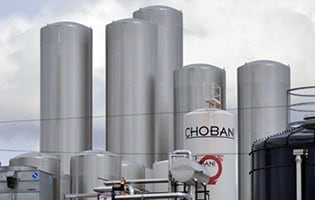Chobani - which declined to comment on the legal action - first started fielding complaints about bloated and fizzy yogurt cups in late August, and issued a formal recall on selected products on September 5 after confirming they had been affected by a "common mold".
It’s not clear how many people ate the affected products, but the FDA told reporters on Monday it had received more than 220 reports from people complaining of cramps, nausea, headache and diarrhea after eating Chobani products - although it stressed this did not prove that the yogurts made them sick.
Chobani: After extensive testing and expert consultation, we now know that the mold … is a species called Mucor circinelloides
Although Chobani provided an update on its website on September 6 revealing that after “extensive testing and expert consultation, we now know that the mold … is a species called Mucor circinelloides”, the lawsuit (filed on September 9 by plaintiff Harold Green in California), notes that Chobani did not initially identify the mold strain.
This left “potentially hundreds, or even thousands, of Chobani consumers … in the dark”, said Green.
“Plaintiff brings this action on behalf of a national class and sub-class of California consumers who, within the last year, purchased and/or consumed recalled Chobani Greek Yogurt which contained a harmful strain of mold that has caused numerous customers and consumers of Chobani to fall sick and ill after consumption and to lose money as a result of the recalled product.”
Plaintiff and members of the Class and Sub-Class were harmed financially and physically, and suffered damages as a result
Green is not specifically seeking damages for food poisoning claims or other personal injuries. However, claims may be modified if future investigations link illnesses to the recalled yogurt, which was manufactured at the company’s new Twin Falls plant in Idaho.
“The presence of a harmful or potentially harmful strain of mold its yogurt is a direct result of the failure of Chobani to manufacture its Greek yogurt within the industry standards.
“As a result of Chobani’s actions, Plaintiff and members of the Class and Sub-Class were harmed financially and physically, and suffered damages as a result.”
Professor: Very rarely, Mucor circinelloides can act as an opportunistic pathogen
A September 6 update on the Chobani website featured a statement from Randy Worobo, professor of Food Science at Cornell University’s College of Agriculture and Life Sciences, who said that Mucor circinelloides “should not pose a health risk to most consumers”.

Worobo added: “Very rarely, it can act as an opportunistic pathogen, but not through food and usually only for people with compromised immune systems through inhalation. The organism is regularly used for the production of natural flavor compounds that are widely used in the food industry.”
Chobani did not respond to questions from FoodNavigator-USA about whether it had identified the source of the mold.
How strong is Green’s case?
So what do the legal experts think?
According to Kristen Polovoy, counsel in the litigation department of Montgomery, McCracken, Walker & Rhoads LLP, cases such as Green v. Chobani have raised “at least two interesting challenges for plaintiffs making similar class action food claims”.
First, while Green is not seeking personal injury damages, he alleges that the putative class members were ‘harmed financially and physically’ and also challenges the Chobani’s marketing and product packaging labels, noted Polovoy.
“Given the assertion of claims on behalf of a proposed nationwide class of consumers who purchased products in various states, the argument could be made... that the laws of 50 different states apply to the putative class claims. This has presented a tension in analogous cases between product liability and other theories of relief, depending on the state law applicable to particular class members.”
In New Jersey, for example, claims that arise from a product’s potential to cause injury are maintainable only under the state’s Product Liability Act (PLA), which requires physical injury to sustain a claim, she noted.
Meanwhile, allegations premised upon misleading ads are instead subject to the New Jersey Consumer Fraud Act, not its PLA.
Therefore, the “legal theories asserted and the scope of the proposed class could create stumbling blocks as to claim viability for plaintiffs [such as Green] going forward,” she suggested.
Is this a nationwide class?
Second, it could be difficult to make a compelling argument for class certification in this kind of case, she said
“In similar cases, courts across the country have found that the variations among the 50 states’ warranty and negligence laws are so different, material and significant that individual issues of law predominate over common ones, thereby failing one of the requirements necessary for class certification.”
We have performed an extensive review of our Idaho facility
When the reports of bloated yogurt cups first hit the headlines in late August, Chobani said it had been working “voluntarily and proactively” with retailers to replace the affected cups, which accounted for “less than 5% of our production”.
However, on September 5, it issued a formal recall for products with the lot code 16-012 and expiration dates between September 11 and October 7, 2013, adding:“While this type of mold is unlikely to have ill health effects, due to some claims of illness the company has decided to go from voluntarily withdrawing to voluntarily recalling the limited amount of potentially affected product.”
On September 11, Chobani added: “We have performed an extensive review of our Idaho facility, and consulted with outside experts to provide objective analysis. We also continue to work with the FDA on the efficacy and speed of our voluntary recall so we can emerge even stronger than before.”
Green is represented by Abbas Kazerounian and Jason A. Ibey of Kazerouni Law Group APC and Joshua B. Swigart of law firm Hyde & Swigart.
The case is Harold J. Green v. Chobani Inc., No. 3:13-cv-02106, in the U.S. District Court for the Southern District of California.
